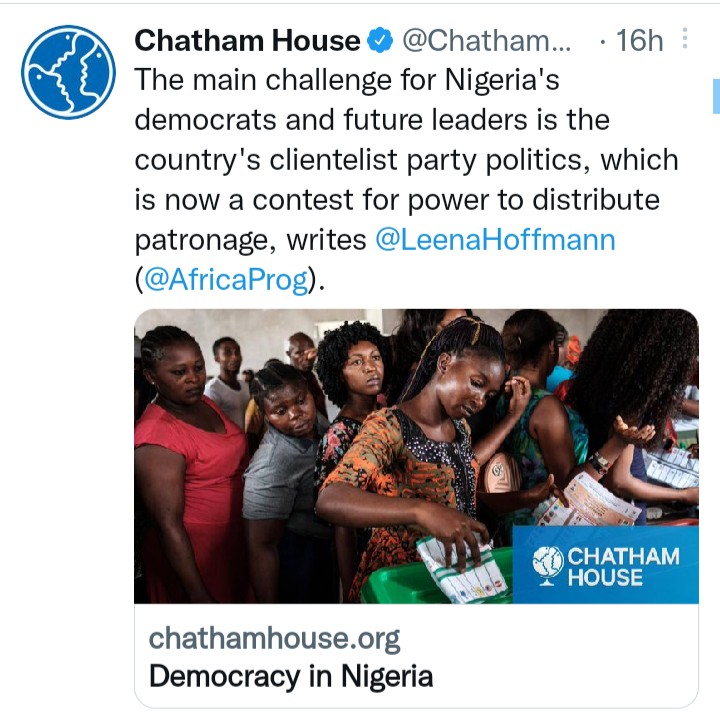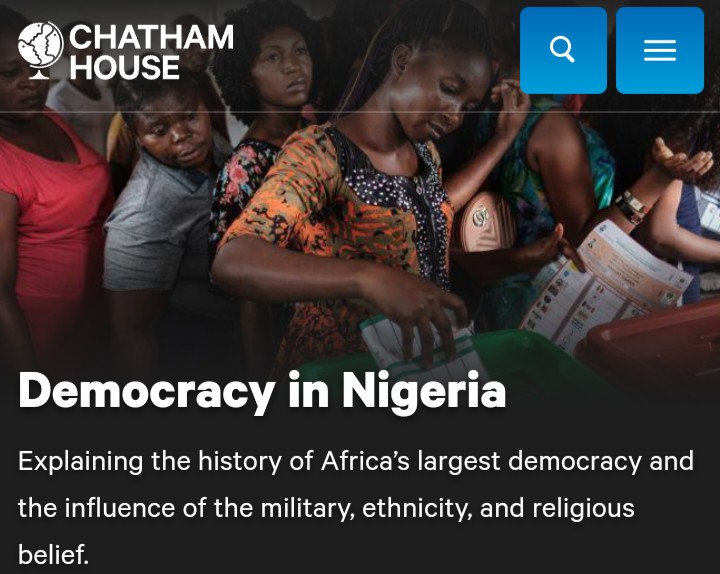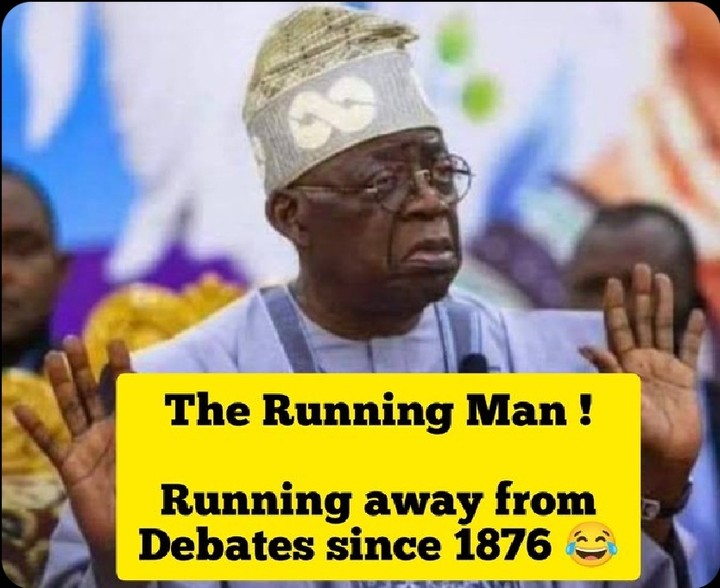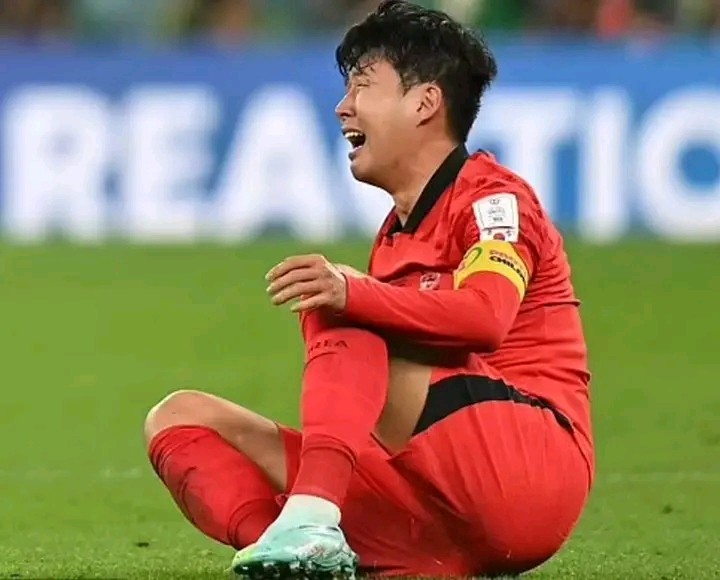| Democracy In Nigeria - Chatham House by Racoon(m): 11:59am On Dec 06, 2022 |
Democracy in Nigeria : Explaining the history of Africa’s largest democracy and the influence of the military, ethnicity, and religious belief.Nigeria’s democracy has been fragile and fluctuating since independence. Successive governments have struggled to create a sense of national unity in a complex country whose borders were drawn by British colonialists, incorporating more than 200 ethnic groups. Democratization and development have progressed at different speeds in the country’s disparate regions.
The less-developed north is more religiously conservative, with the Hausa and Fulani people forming a majority in far north-western states, and the Kanuri being the largest group in the north-east. Women in Nigeria’s northern states gained the vote decades later than women in the south, with universal suffrage not achieved until 1979.
The mostly Christian Igbo people are the largest ethnic grouping in the south-east, where there are less centralized and more egalitarian traditions, as well as a tense history of separatism from Nigeria.
206m people is the population of Nigeria in 2020, according to the World Bank.
The more religiously-diverse Yoruba people are the largest group concentrated in the south-west where identity is more influenced by regional culture and values.
Nigeria’s democracy also has a long and troubled relationship with its military. For more than half of its existence as an independent state, Nigeria has been under military rule instead of civilian administration.
Three republics have been overthrown by military coups since independence in 1960, and two of the four democratically-elected presidents of Nigeria’s fourth republic headed those military dictatorships.
This article explains the role of the military, the fluid influence of ethnicity, and the quest for a better democracy in Nigeria.
Is Nigeria a democracy?
Nigeria has a democratic constitution with a federal system modelled on the US. The executive is headed by the president, the legislature is formed by the National Assembly of Senate and House of Representatives, and the judiciary is headed by a supreme court.
But some commentators say Nigeria is not currently a true democracy due to its entrenched corrupt political class, its dwindling electoral participation, popular suspicion of the ruling class, shrinking civil liberties, and weak democratic institutions.
A history of democracy in Nigeria
Nigeria officially became a democracy on its independence from Britain in October 1960. But the history of Nigerian demands for greater representation go back to the 1920s.
A new constitution was created in 1922 under British colonial rule, largely due to Nigerian calls for reform. The country’s first general election – to a colonial legislative council – was held the following year.
The colonial administration hoped to contain demands for full independence but the elections failed to suppress Nigerians’ desire for control of their own affairs.
Civil resistance continued throughout the 1920s led mainly by women and student movements. The Aba Women’s riots of November 1929 saw protests by thousands of Nigerian women against the unjust rule of ‘Warrant Chief’ tribal officials appointed by the colonial government. Young nationalists in the Lagos area founded the Nigerian Youth Movement in 1936.
After World War Two, it became clear Nigeria would become independent. In the 1950s another new constitution created a structure for Nigeria’s federal government and paved the way for an end to British rule. The 1959 general election saw a victory for the Northern People’s Congress, which formed a coalition government with the south-eastern dominated National Council of Nigeria and the Cameroons.
This created the first ever Nigerian led self-government, which would steer the nation into independence in 1960. Sir Abubakar Tafawa Balewa served as Nigeria’s first – and only – prime minister and Nnamdi Azikiwe became governor-general. For the first three years of independence, Nigeria was a constitutional monarchy with Britain’s Queen Elizabeth remaining as head of state.
The first republic
In 1963 the country became a federal republic with Azikiwe as the first president and head of state, and Balewa continuing as prime minister and head of government.
But democracy under the first republic quickly deteriorated. Elections were held in 1964 but the event highlighted widespread resentment towards the domination of the central government by northern politicians. There were also outbursts of inter-ethnic violence and Balewa was assassinated in 1966 as part of a bloody, failed military coup.
In the chaos that followed Major General Johnson Thomas Umunnakwe Aguiyi-Ironsi seized power but ruled for only six months before being overthrown in a counter-coup. He was replaced by Yakubu Gowon, beginning almost a decade of rule by a ‘supreme military council’.
Military rule under Yakubu Gowon
Gowon’s administration was rejected by Lt. Colonel Odumegwu Ojukwu, the military head of Nigeria’s eastern administrative region. In 1967 Ojukwu led the region’s secession, declaring himself president of the Republic of Biafra in protest against the Gowon regime and the pogroms of the Igbos in the north.
A brutal civil war followed, unleashing famine, death, and destruction in the south-east. Both sides were armed and supported by foreign actors interested in the future of the oil-rich country with Britain arming the Nigerian military government.
The civil war had an enormous impact both in Nigeria and internationally. After the surrender of a severely damaged Biafra in 1970, Nigeria was divided from three regions into 12 states in an effort to strengthen the central power in Lagos and undermine future secession attempts.
Civil war had an enormous impact both in Nigeria and internationally
Beyond Nigeria, images of the war’s famine led to an enormous international humanitarian appeal by charities such as the Red Cross and Save the Children. An expensive reconstruction effort followed the war, paid for by oil revenues.
But Gowon’s military government was seen as corrupt, incompetent, and failing to guide the country back towards democracy. Gowon was overthrown in a bloodless coup in 1975, replaced by General Murtala Mohammed who was then assassinated during an unsuccessful coup attempt in 1976. His deputy, Lieutenant General Olusegun Obasanjo took charge and oversaw Nigeria’s transition to democracy.
The second republic
Elections In July and August 1979 saw Shehu Shagari become the first democratically-elected president of Nigeria and a new constitution introduced an American-style presidential system, rejecting the British parliamentary model. But Shagari’s government was characterized by extensive corruption, wastefulness, and a failure to thaw civil-war era ethnic and religious divisions in the country.
The second period of military rule
The government declared itself the winner of 1983’s heavily-disputed election. A violent response in Nigeria’s south-west saw another military coup take place with Major General Muhammadu Buhari declaring himself leader of a new military council.
His authoritarian leadership was unpopular and worsened by a recession. His government was overthrown in August 1985 by General Ibrahim Babangida who promised to end military rule by 1990 but would stay in power until 1993. He expanded a corrupt patronage network mostly sustained by oil revenues which has been reorganized but still endures in Nigeria.
Babangida refused to recognize the outcome of the free and fair elections held in June 1993. He imprisoned the elected president Moshood Kashimawo Olawale Abiola and stymied the creation of a full-fledged third republic. But he struggled to contain domestic pro-democracy demands before creating an interim government council later that year which was then quickly replaced by a new military ruler General Sani Abacha.
Abacha’s rule was cruel and marked by human rights abuses such as the case of the ‘Ogoni Nine’. This group of environmental activists protested about oil pollution in the Niger delta but were executed in 1995 on fabricated murder allegations. Under Abacha’s corrupt and brutal leadership, Nigeria became a pariah nation.
The fourth republic
Abacha died in mysterious circumstances in 1997. Another transitional military government led by General Abdulsalami Abubakar oversaw a return to democracy with elections held in April 1999. Former military ruler Olusegun Obasanjo was elected president on the platform of the People’s Democratic Party (PDP), a broad coalition of political elites and power brokers.
Obasanjo served two complete four-year terms in office, beginning the longest period of uninterrupted democratic government. The current incumbent is another former military leader, Muhammadu Buhari.
Challenges of democracy in Nigeria
Nigeria’s democracy was severely weakened by the civil war and centralization of power during the military era. The conflict helped concentrate oil revenues in the hands of army officials and seeded a powerful, wealthy, and often corrupt military elite. The dictatorships militarized Nigeria’s political space and disrupted the flourishing of democratic institutions and culture.
Nigeria’s army once regarded as the continent’s most capable has been dramatically weakened over the past decade. It has failed to provide basic security in large parts of the country, struggling to contain an insurgency by the terrorist group Boko Haram in the north-east. Its officer corps has been implicated in numerous corruption scandals.
Nigeria’s federally-controlled police is overstretched, understaffed, underfunded, and endemically corrupt. These security and law enforcement challenges are aggravated by the fledgling state of Nigeria’s democratic institutions.
Freedom of speech
A vibrant media industry exists in Nigeria, much of it based in the south-west, but the government has been cracking down on the free press as evidenced by its actions during the #ENDSARS protests of 2020.
Twitter was banned for more than a year following the protests, while big media houses closed and journalists fled, diminishing open debate. Security incidents go unreported or misrepresented for fear of reprisals by the government.
Elections
Most elections in the fourth republic have been regular, generally free, and credible, although this varies considerably by region and election cycle. Violence is a lingering feature of elections in Nigeria.
Voter turnout has steadily decreased as voters have become disillusioned by the recycling of political candidates, the lack of internal democracy in political parties, and the failure of government to deliver real progress.
Justice
The constitution guarantees Nigerians freedom of religion, expression, movement, and assembly and protects them from discrimination based on sex, religion, origin, or political opinions. Yet basic rights are continually challenged in a failing justice environment.
Nigeria’s police have a reputation for brutality which led directly to the #ENDSARS protests of 2020, demanding the dismantling of the Special Anti-Robbery Squad, a unit accused of kidnapping, murder, theft, rape, and torture.
Sharia penal code has been reintroduced in 12 northern states, directly challenging the constitution and civil liberties of non-Muslim residents. In April 2022 a man was sentenced to 24 years in jail by a Sharia court in Kano on a charge of blasphemy for declaring himself an atheist.
The judicial system is too weak and compromised to step in and enforce civil liberties. This reflects the state of the political class in northern Nigeria and the absence of mechanisms to defend constitutional democracy. Religious legitimacy shapes political power in the north in a way that challenges national cohesion and a common citizenship. Parallel legal systems undermine the main pillars of the constitution.
Benefits of democracy in Nigeria
To many Nigerians democracy seems to have few benefits. Between 2015 and 2022, the democratically-elected government of Buhari presided over worsening security, continuing corruption, and two recessions.
44% of public service users in Nigeria reporting paying a bribe in a year, according to Transparency International.
Nigeria became the poverty capital of the world, consistently ranked as one of the world’s most corrupt nations. But the #ENDSARS movement showed the democratic dynamism of young Nigerians. And technology has helped demands for better government to transcend old ethnic, religious, and linguistic divides.
#ENDSARS did not produce a political party and in many ways its separation from traditional politics was its power. But it showed a hunger for more democracy, not less, among Nigerians and a solidarity among Nigeria’s enormous population of young people.
Nigeria needs more young people to engage with politics, offer new ideas and run for office on issues which affect all Nigerians, from employment and security to climate and energy policy.
Nigeria also needs its youth committed to the kind of long-term civic activism and community organizing which expands the narrow focus on electoral cycles, strengthens democratic institutions, and delivers long-term change. The main challenge for these young democrats and future politicians is Nigeria’s clientelist party politics, which is mostly a contest for power to distribute patronage.
18 years old is the average age in Nigeria.
Nigeria’s democracy can only be strengthened through a revolutionized political system, better quality political parties, more independent and diversified media, a stronger electoral management body and well-resourced judiciary.
Law enforcement and security forces must be devoted to constitutional democracy rather than regime security and protecting elites. And entrenched networks of patronage and privilege need to be weakened.
Sustaining democracy in Nigeria will require more than just free elections. It will also mean ending a system in which corruption is not just tolerated, but widely encouraged and hugely profitable.
The importance of democracy in Nigeria
Given its history and its current trajectory, democracy is essential to the survival of the Nigerian nation. Military government was not more just, accountable, or efficient than democracy, nor was it less corrupt.
Democracy has not yet delivered a considerable uplift in living standards for most Nigerians. But it remains the only system of government which can offer the hope of reconciling the extraordinary plurality of religions, ethnicities, and political traditions of its large population. It is the only system of government which can create a fair society without resorting to oppression or the exclusion of considerable parts of the population.
The importance of democracy
It is also essential for the rest of Africa that democracy survives in Nigeria. Half of West Africans are Nigerians and if democracy were to fail there it would have enormous implications for the rest of the continent and for the world.
Nigeria’s democracy needs to serve the rights, aspirations, and potential of its citizens for a good, dignified and fulfilled life. https://www.chathamhouse.org/2022/06/democracy-nigeria 3 Likes 

|
| Re: Democracy In Nigeria - Chatham House by Racoon(m): 12:02pm On Dec 06, 2022 |
Nigeria’s democracy can only be strengthened through a revolutionized political system, better quality political parties, more independent and diversified media, a stronger electoral management body and well-resourced judiciary.
Law enforcement and security forces must be devoted to constitutional democracy rather than regime security and protecting elites. And entrenched networks of patronage and privilege need to be weakened.
Sustaining democracy in Nigeria will require more than just free elections. It will also mean ending a system in which corruption is not just tolerated, but widely encouraged and hugely profitable. |
| Re: Democracy In Nigeria - Chatham House by Racoon(m): 12:05pm On Dec 06, 2022 |
To many Nigerians democracy seems to have few benefits. Between 2015 and 2022, the democratically-elected govt of Buhari presided over worsening security, continuing corruption, and two recessions. Nigeria became the poverty capital of the world, consistently ranked as one of the world’s most corrupt nations.
Nigeria’s police have a reputation for brutality which led directly to the #ENDSARS protests of 2020, demanding the dismantling of the Special Anti-Robbery Squad, a unit accused of kidnapping, murder, theft, rape, and torture.
But the #ENDSARS movement showed the democratic dynamism of young Nigerians. And technology has helped demands for better government to transcend old ethnic, religious, and linguistic divides. 9 Likes |
| Re: Democracy In Nigeria - Chatham House by Racoon(m): 12:09pm On Dec 06, 2022 |
Challenges of democracy in Nigeria
Nigeria’s democracy was severely weakened by the civil war and centralization of power during the military era. The conflict helped concentrate oil revenues in the hands of army officials and seeded a powerful, wealthy, and often corrupt military elite.
The dictatorships militarized Nigeria’s political space and disrupted the flourishing of democratic institutions and culture.Nigeria’s army once regarded as the continent’s most capable has been dramatically weakened over the past decade.
It has failed to provide basic security in large parts of the country, struggling to contain an insurgency by the terrorist group Boko Haram in the north-east. Its officer corps has been implicated in numerous corruption scandals. 4 Likes 1 Share |
| Re: Democracy In Nigeria - Chatham House by Efuaye(m): 12:18pm On Dec 06, 2022 |
We haven't yet fully developed Democratically!
Civil rule in Nigeria? Yes!
Democracy? Not yet!
Is the British colonial Masters helping Nigeria to develop? No!
Is Nigeria ready to develop even after decades after independent? A session wants to as ever but the rest don't really care that much! 9 Likes |
| Re: Democracy In Nigeria - Chatham House by OyeofIkoTuN(m): 12:39pm On Dec 06, 2022 |
I repeat..
The British cannot tell us our story... Doesn't work that way.
If there is nothing like North East in UK, we have no classification like that.. This is pure mental division tactics..
We will tell ourselves our story and decide how we want to move forward.. 11 Likes 1 Share 

|
| Re: Democracy In Nigeria - Chatham House by Villa12(m): 12:39pm On Dec 06, 2022 |
JAGABAN |
| Re: Democracy In Nigeria - Chatham House by Brendaniel: 12:40pm On Dec 06, 2022 |
Tinubu is a complete fraud... 6 Likes 1 Share |
| Re: Democracy In Nigeria - Chatham House by Reporting34(f): 12:41pm On Dec 06, 2022 |
Just deceiving yourself |
| Re: Democracy In Nigeria - Chatham House by Nobody: 12:41pm On Dec 06, 2022 |
Those who destroyed your present cannot build your future. There is nothing APC has to offer Nigerians but suffering. I supported APC in 2015 and 2019 so I know and I've seen how all their promises are fake. A vote for APC = generational suffering for your children, unborn children and their offsprings. A word is enough for the wise. 10 Likes 1 Share |
|
| Re: Democracy In Nigeria - Chatham House by johnpope1: 12:42pm On Dec 06, 2022 |
Show of shame |
| Re: Democracy In Nigeria - Chatham House by Kitotechseugtgg: 12:42pm On Dec 06, 2022 |
Ok |
| Re: Democracy In Nigeria - Chatham House by gerrardomendes(m): 12:43pm On Dec 06, 2022 |
There was a country 2 Likes |
| Re: Democracy In Nigeria - Chatham House by ATEAMS: 12:43pm On Dec 06, 2022 |
British empire colony |
| Re: Democracy In Nigeria - Chatham House by Akfrenzy(m): 12:43pm On Dec 06, 2022 |
|
| Re: Democracy In Nigeria - Chatham House by Stevenson20: 12:43pm On Dec 06, 2022 |
The number of votes Baba Blue will get in 2023 will determine the number of mad people we have in this country 8 Likes 1 Share |
| Re: Democracy In Nigeria - Chatham House by bro4u: 12:44pm On Dec 06, 2022 |
Article just open Nigeria yansh waa 1 Like |
| Re: Democracy In Nigeria - Chatham House by saudatu(m): 12:45pm On Dec 06, 2022 |
Noted |
| Re: Democracy In Nigeria - Chatham House by ademasta(m): 12:46pm On Dec 06, 2022 |
|
| Re: Democracy In Nigeria - Chatham House by Akonimohate12: 12:47pm On Dec 06, 2022 |
I'm tired of this country. 3 Likes 
|
| Re: Democracy In Nigeria - Chatham House by ganisucks(f): 12:47pm On Dec 06, 2022 |
One character on nairaland said Tinubu was playing "Who wants to be a millionaire", at Chatham House. He was doing, ask the audience and call a friend.
The dumbest people on this planet all work for Tinubu. Now, that's a fact. 5 Likes |
| Re: Democracy In Nigeria - Chatham House by toprealman: 12:47pm On Dec 06, 2022 |
OyeofIkoTuN:
I repeat..
The British cannot tell us our story... Doesn't work that way.
If there is nothing like North East in UK, we have no classification like that.. This is pure mental division tactics.. The whole concept of chaltam house is a form of neocolonialism. Imagine UK prime minister coming to an organisation in Nigeria to campaign. Our leaders will never cease to amaze me. Will you call the moderator a journalist? That guy must have been paid his 5years salary that night to put up such ludicrous act. 3 Likes |
| Re: Democracy In Nigeria - Chatham House by Wealthoptulent(m): 12:47pm On Dec 06, 2022 |

|
| Re: Democracy In Nigeria - Chatham House by Newyorkitis(m): 12:48pm On Dec 06, 2022 |
They had to release this because they are terribly saddened about two of the candidates who want to become the President of Nigeria next year.
One of them disgraced himself and his entourage yesterday.
Chatham house are passing a subtle message that only the Obidents can deduce. 2 Likes |
| Re: Democracy In Nigeria - Chatham House by OyeofIkoTuN(m): 12:49pm On Dec 06, 2022 |
toprealman:
The whole concept of chaltam house is a form of neocolonialism.
Imagine UK prime minister coming to an organisation in Nigeria to campaign.
Our leaders will never cease to amaze me. I think Nigerians should begin to write about their crusader movements, Irish and Scottish tales,Middle Eastern wars, British petroleum and the negative effects it has on Nigeria. 1 Like 1 Share |
| Re: Democracy In Nigeria - Chatham House by Newyorkitis(m): 12:50pm On Dec 06, 2022 |
Stevenson20:
The number of votes Baba Blue will get in 2023 will determine the number of mad people we have in this country Hahahahahahahahaha 1 Like |
| Re: Democracy In Nigeria - Chatham House by ganisucks(f): 12:51pm On Dec 06, 2022 |
Newyorkitis:
They had to release this because they are terribly saddened about two of the candidates who want to become the President of Nigeria next year.
One of them disgraced himself and his entourage yesterday.
Chatham house are passing a subtle message that only the Obidents can deduce. No, he was playing "Who wants to be a millionaire", without Frank Edoho. 1 Like |
| Re: Democracy In Nigeria - Chatham House by Ecbatana: 12:51pm On Dec 06, 2022 |
A good summation of Nigeria's history but where do we go from here? It is very disheartening that the younger generation will learn their history as told by strangers. |
| Re: Democracy In Nigeria - Chatham House by yinkeys(m): 12:53pm On Dec 06, 2022 |
Efuaye:
We haven't yet fully developed Democratically!
Civil rule in Nigeria? Yes!
Democracy? Not yet!
Is the British colonial Masters helping Nigeria to develop? No!
Is Nigeria ready to develop even after decades after independent? A session wants to as ever but the rest don't really care that much! Civil rule ? No proper conflict resolution procedures or dialoguing. They shoot protesters with live bullets in north & south Someone makes a comment online and he gets locked up instantly with no court intervention. Funny Just take a look at what the middle easterners did with their oil money Qatar is hosting the world as we speak We’ve never had problem solvers or visionaries for leaders They’d sign rubbish deals to favour developed countries which also plunge our citizens in poverty |
| Re: Democracy In Nigeria - Chatham House by tyinfinity: 12:53pm On Dec 06, 2022 |
Someone of peter obi's caliber can never be accepted to talk In this house in london |
| Re: Democracy In Nigeria - Chatham House by onuman: 1:01pm On Dec 06, 2022 |
Racoon:
Democracy in Nigeria : Explaining the history of Africa’s largest democracy and the influence of the military, ethnicity, and religious belief.
https://www.chathamhouse.org/2022/06/democracy-nigeria Nigeria's democracy is a false democracy given that the military dictators from the north of Nigeria created too many and undue numbers of states and federal constituencies in the far north of Nigeria.
Through the undue large number of states and federal constituencies in the far north, the far north largely determines more than the other regions, who becomes president of Nigeria.
A presidential candidate must win 25% of votes in 24 of the 36 states in Nigeria. This provision largely assigned overbearing electoral influence to the far north states.
There should have been equal number of states between the three regions - north, east and west - that formed independent Nigeria in 1960. Since the states were created, all efforts by the southern regions for democratic restructuring of Nigeria politically, have been spurned by the political class from the far north.
1 Like |

